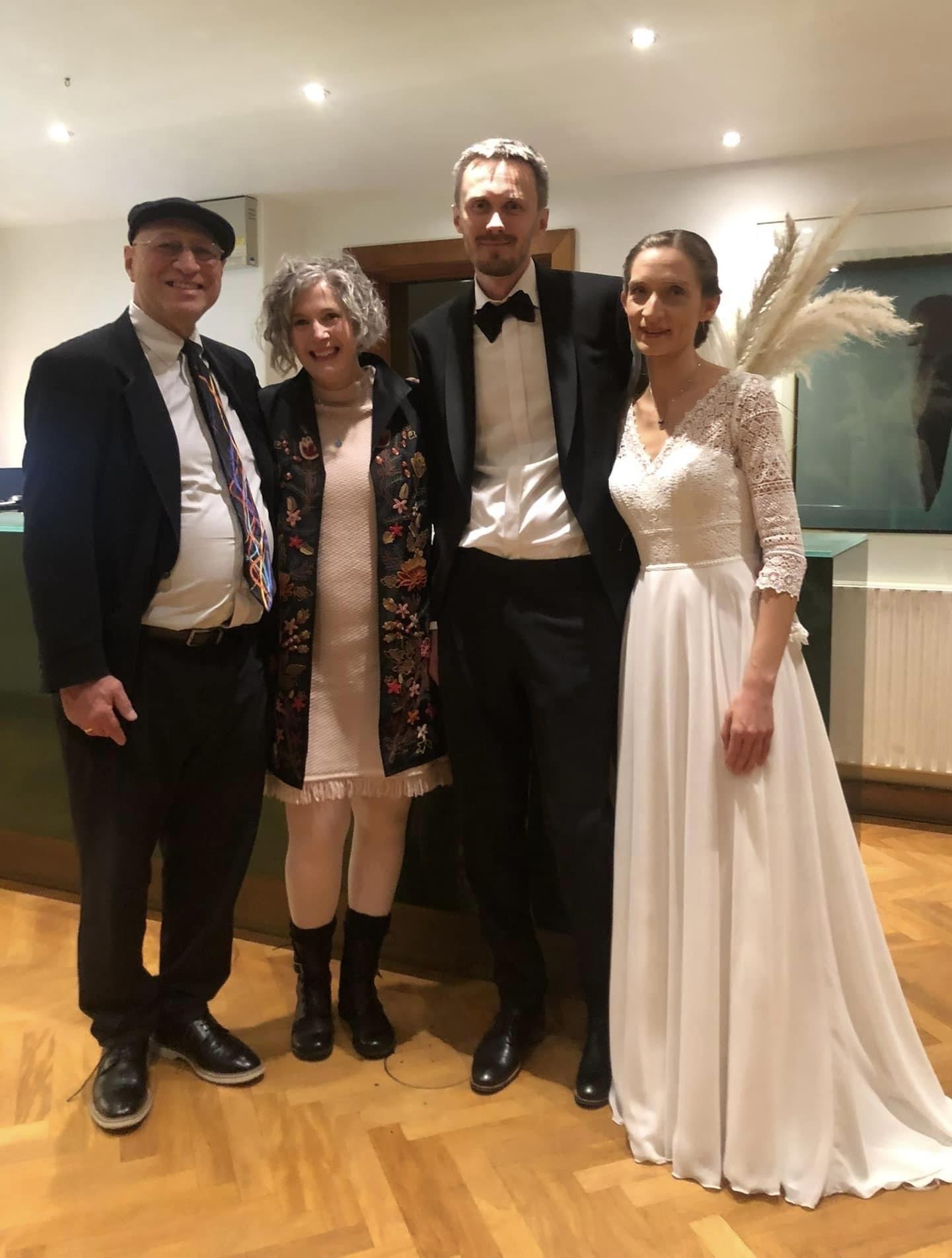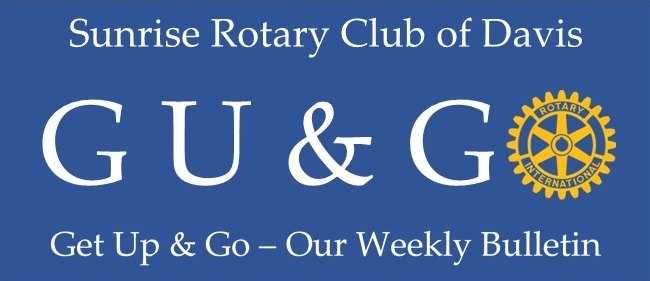
Reporter - Frances McChesney
Photos - Roy Kroener and Archives
March 25, 2022
President David started us off, sort of promptly, when he rang the bell a bit after 7 am. And, this scribe never gets tired of hearing Smile so beautifully sung by Chuck – remotely this time.
Vanessa’s guests brought the average age down dramatically -her children got to visit us today during spring break. Arnie Wolf – a past Sunrise Rotarian visited us today. I’m not clear if that means he is a guest or a visitor or what?
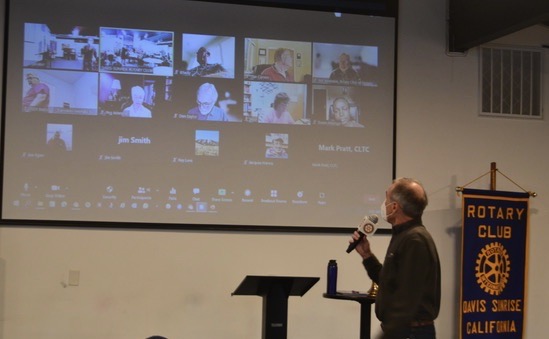
Announcements: David announced that it is still possible to donate to assist Ukrainian refugees through Rotary International’s Disaster Relief Fund. And as a club we have donated more than 20% of the amount promised by District 5160 – what a generous group; John Morgan announced that the International Committee invites all of us to join a zoom meeting to learn about potential projects in Latin America – this was on Friday and Saturday (March 25-26). Vanessa announced that the Demotion Dinner will be on June 24 at (Brodie . . . ?) 5:45 pm, location TBD.
Who Am I? Susan Morenga – zooming in from Nairobi, Kenya (don’t we just love zoom!!) was our Who Am I? speaker of the day. Susan was the first born to wonderful parents and has 2 siblings. She grew up in Kise, and attended high school and college in Nairobi, earning a biotechnology degree. She met her future husband in college but before they got married she left for the Netherlands for graduate school, and then moved to Davis to earn her PhD at UCD. During those 6 ½ years in Davis she joined our very own Davis Sunrise Rotary Club. After returning to Nairobi she married her long time beau and now has a young son, who blesses her with joy, giggles, and sometimes sleepless nights that never take away from what he brings to her life. She appreciates living near her extended family – traditional in Kenya – who help with the joys of parenting. At UCD she worked on projects with chick peas and continues with efforts to derive protein from chick peas. She has been working from home since COVID. She says it has been wonderful to keep connected to the club in Davis and looks forward to seeing us in person post-pandemic.
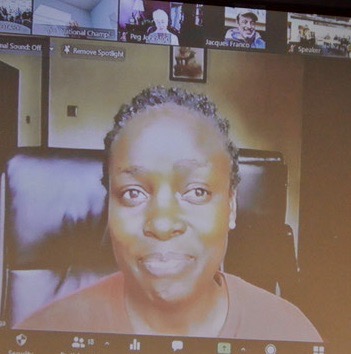
Sydney was our Sergeant of the day and there were so many Happy Bucks, she didn’t have time to fine too many people.
Arnie Wolf was the first to express being happy to be back to a meeting with the Club; Chuck Cunningham was happy for his grueling 3 ½ hour hike but got to see gorillas in Rwanda, including the baby that Chuck’s wife got to name; Don Morrill was happy that we started our Putah Creek project – 12 people participated in the first event representing 3 clubs and some high school students; Clay was happy that he and another Rotarian were able to successfully install solar panels on a barn in Amador County with no incident; Meghanwas happy to be in person; Vanessa is happy to be turning 40 and generously donated $400 to the International Foundation and happy to note that she and her daughter will be participating in a fashion show on her 40th birthday; Nancy Storm was happy to be able to count on Tom McHale who covered the student of the month event while she went skiing – thank you Tom McHale – And she is happy to report that the crab feed was a big success and netted $95,000; Mack Walker enjoyed a restful trip to a Palm Springs tennis event where he imbibed champagne with strawberries and came back in time for his granddaughter’s birthday party (with no champagne I assume, but maybe there were strawberries); Steve Shaffer is happy to report that on Saturday March 26 there will be a virtual barn raising of sorts – painting a climate action mural on a barn at a farm on Road 102.
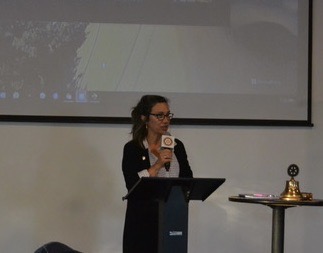
Speaker of the Day: Julia Johnston gave a provocative presentation on how land use planning can take care of people. Julia was formerly the land use and natural resources program director at UCD; now she leads the California Association of Councils of Government (members are local governments). She has been a planner for more than 25 years for government and planning associations and started an award-winning speaker series on planning that has been going on for 14 years. She is an advocate for the importance of planners and for good planning. It was great to see that members of her family joined us on zoom. She grew up in a Rotary Family – her mother, father, brother, and others are involved in Rotary. She learned as she grew up that every day leadership improves our community and people’s lives.
She provided us examples of the negative impacts of urban planning, including systemic racism due to redlining and racial covenants (labeling certain areas of a community, typically low-income or high percentage of African Americans, as high risk resulting in segregation). “Urban renewal” was an often misguided government program that tore apart neighborhoods and planners were often complicit in such actions.
She covered a number of questions she has heard:
- What is planning? – any government action, but more focused is actions government does to create communities
- Why Planning? – it acts as a mediator between free market and humanist society; the planner thinks about public good (clean air, water, etc); good planning balances between the drive for money/power and a healthy community.
Zoning initially focused on public health – the goal was to separate factories from where people live. Creating green space is a common theme that often has negative impacts. For example, Central Park in New York provided green space but resulted in ripping out a thriving African American community.
Julia continued with the complexities of planning. Planners facilitate finding a balance, but planners also bring their own biases. Who benefits from planning? How to make sure decisions are beneficial and equitable? She said the key was to engage and motivate the effective community and noted that people make good choices with experience and thorough information. She has noted in her experience that there is a tendency to adopt to established principles, changes are often difficult to achieve. Planners often serve as conduit between people and government and they can educate both about impact of change and about choices, but they can’t plan alone. It takes robust communication with leaders in our communities. One example of a difficult change is that Sacramento is considering doing away with single family zoning and people are worried about the consequences of such a change. Some of the impacts of planning decisions: Displacement of long term residents due to gentrification and building in areas subject to wild-fire or sea level rise or flooding. She suggested that updating general plans could assist with dealing with some of these issues.
David did not forget the draw of the day!! Vanessa’s kids got back in action by Ella mixing and Jack drawing the ticket for the Draw of Day – John Morgan won, guess what, a free breakfast.
Editor's Note: Last week Dick Bourne was our illustrious scribe and he provided a great photo of Davis and Susana Foos who attended the wedding of Peter Nicholiesen a former Rotary exchange student from Denmark. The picture was left out (well actually the editor forgot!!). Enjoy:
